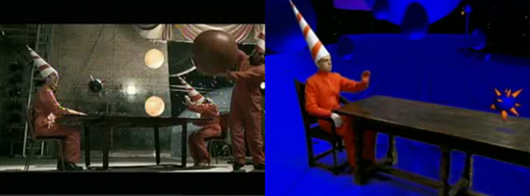In 2004, as the Matrix Ping Pong video link bounced its way from inbox to inbox, people where amused by the re-creation of a ping pong match with Matrix style special effects, using people instead of computer technology. Viewers were amazed at the elaborate costumes, only to be topped by even more amazing choregraphy. Perspective changes and camera angles are reproduced. Influences of Matrix 360 camera spinning and earlier Cantonese martial arts films are pervasive. Part of its success was the evident work and planning that was required to design and execute the scene. The idea of simulating the simulated was both ingenious and topical. However media criticism aside, it’s just a pleasure to watch.
The clip comes from a popular Japanese television show Kasou Taishou, where contestants performs skits before a panel of judges. These skits often involve re-creating camera work and special effects of film. That same year, Neil Tennant and Chris Lowe of the UK pop band Pet Shop Boys release the video for the song “Flamboyant.” In the video, a (stereo)typical Japanese corporate employee is seen struggling to design a skit for the show. Interspersed in the video are mock Japanese ads starring Tennant and Lowe. Two years later, they take the idea one step further recently their their new video, for “I’m with Stupid.” In it, Matt Lucas and David Walliamsthe stars of the British comic skit series “Little Britian” to replicate PBS videos “Go West” and “Can You Forgive Her.” The result is a bizarre re-intereption of the CGI intensive PBS videos.
When I first started on this post, I was going to try to say that these examples are a “reaction” to the increasing virtual parts of lives. However, my thinking has shifted towards this reading this phenomenon as the process of “reflection” that has a long traditional in cultural production. As our lives are becoming increasingly virtual, synthetic, and digital, our analogue lives reflect back the new digital nature of what we experience. Like a house of mirrors, people are reflecting back what they see. These mirrors, as found in the amusement parks, distort the original image, bending and stretching people’s reflection, but not beyond recognition. The participants on Kasou Taishou started copying the images from the Matrix, which itself is a reflection or new interpretation of the fight choreography of Cantonese martial arts films. Pet Shop Boys first merely replay their reflection (with splices of fake Japanese commerical staring themselves.) Things get much more interesting when Tennant and Lowe realize that the truly interesting part of the Flamboyant video was re-creating the digital with the analogue, while adding their own personal distortion through a distinctly British comedic lens.

Advances in telecommunication and media production technology have blown open the opportunity to create and share these types of cultural call and response we are witnessing. The history of parody is a prime example of this, a traditional cultural dialogue through media artifacts. I’m not all surprised, in this case, that Japan is playing a role here. In that, I have always been both fascinated and amazed by the observed way that Japanese culture seems to balance the respect of tradition with the advancement of modernity, especially with technology. Although, I realize that distance and language barriers may mask the tensions between these cultural forces. Part of the balance is achieved by taking the old and infusing it into the new rather than completely reject the old. Further, in the case of the real simulating the virtual, the diversity of modes of creation and distribution is extremely telling. Traditional roles are blurred. The one-to-many versus many-to-many broadcast models, East v. West cultural dominance, corporate v. independent media and pro/am production distinctions are being rendered meaningless. The end result is a far richer landscape of cultural production.
if:book
A Project of the Institute for the Future of the Book
